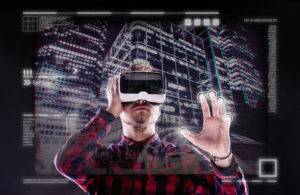

Part of the confusion surrounding the term stems from the difficulty of classifying thinking, or intelligence, with regards to technological implementation. However, it’s enough to say that artificial intelligence is a machine or computer that has the power of human reasoning in some capacity.
What is Virtual Reality?

Online Gaming Statistics

In the United States alone, there are over 55 million online console gamers. This statistic is expected to grow by 3% in 2020.
- The global PC online game market was worth 25.1 billion US dollars back in 2015, so one can only imagine what it’s worth now.
- 22% of people who play games on their PC spent more than half of their time playing multiplayer online games.
- Another 26% of people who use a console say they spent more than half of their time playing multiplayer online games.
Moreover, gaming is something that attracts all ages. Quite often we conjure up images of spotty teenagers in their parent’s basement gaming their life away, but statistics actually show that gamers who are over 50 (yes, over 50) are very fond of online games. Over 59% of gamers over 50 use online gaming services of some kind.
These statistics are just a small selection that reflects how popular online gaming is. It’s clear that many gamers will be impacted by AI and VR.
How Does Artificial Intelligence Impact Online Gaming?

This trick, or algorithm, is called the ‘Finite State Machine’ algorithm. In simple terms, it allows the NPCs to learn from their experiences and adjust their reaction accordingly. In a shooting game, for example, the AI NPC would know to attack when a human player is on the scene, but would also have the self-awareness to retreat when in danger.
So, how does AI impact online gaming? Well, AI is an intelligent machine, so it is able to use reason and logic to solve problems much like a human does. When applied to gaming, this means that it can make the experience more unique for the user.
Most gamers love a challenge, and what’s more challenging than a character in a computer game that has the ability to improve its reactions?
One of the key challenges for software developers is to ensure that a game they develop is engaging, but not impossible to win. Cutting-edge AI software can literally make a game unplayable if the AI becomes too intelligent.
How Does Virtual Reality Impact Online Gaming?

Companies who specialize in VR gaming are developing new and innovative ways to enhance the user experience. For example, League of Legends recently introduced a 360-degree arena mode. This allows users to look all around them and interact with other players, almost as if they are standing next to each other.
VR is making waves in the world of gaming, and even simple games like online poker are being modified and enhanced using VR technology.
It’s clear that VR has the power to truly revolutionize the gaming industry, and the more mainstream it becomes, the more developments we will see in the future.












